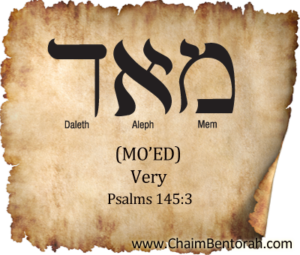Hebrew Word Study – Very – Mo’ed מאד Mem Aleph Daleth
Psalms 145:3: “Great [is] the LORD, and greatly to be praised; and his greatness [is] unsearchable.”
 “God is quite capable of seducing His own partner, He doesn’t need the band leader to persuade the shy person into dancing with Him.” Chaim Bentorah
“God is quite capable of seducing His own partner, He doesn’t need the band leader to persuade the shy person into dancing with Him.” Chaim Bentorah
Our English word for great is pretty inclusive. It means great in size, power and proportion. It also means first rate or the best. The word great in Hebrew is gadol which means all that our English word great means plus more. The word is rooted in an old Akkadian word which means to make strong, firm. It is used for twisting a rope to make it stronger and firmer. So when we say Great is the Lord, we are speaking of his increasing strength and power. His great power.
So what does it mean to greatly praise Him? Most modern translations will say He is worthy of praise or high praise. Some will say highly to be praised or greatly to be praised. The NIV says most worth of Praise. Actually the word great, worth or high is not found in this text as a modifier of Praise. It is the Hebrew word mo’ed which is often rendered as very. The words to be are also not found in the text. It is the preposition Mem or from that is used. Of course that sounds very awkward to say: “And from praise very.” That is meaningless so translators paraphrase what they believe the intent is and what tradition would dictate as its intent which is greatly to be praised. I have no problem with that although it sounds a bit redundant and Hebrew poetry is not noted for redundancy, just for restating a matter to bring out its beauty. Suppose we do not call mo’ed an adverb? We don’t have to you know. The word mo’ed comes from the root word ‘ud which in its Semitic origin is a poker used to turn a fire. You use the poker to make the fire intense or to increase its heat, to make it stronger.
Would you like Chaim Bentorah as your personal Hebrew teacher?
|
|
Suppose we step out of the box for a moment and do our own paraphrasing. Let’s not call mo’ed an adverb but make it a noun. We could render this as “from praise it (God’s greatness) increases.” Of course we do not increase God’s greatness but we do increase our praise so that our awareness of His greatness increases. In praise God reveals Himself in ways that the world will not understand. Our time of praise to Him is an intimacy with Him.
I mean really? Is God that insecure that He needs us to constantly remind Him how great He is? That we have to constantly heap praise and worship on Him to enhance His self image? Why does God want us to praise Him? Well, why does a wife want her husband to say she is beautiful, to hug her and praise her? Such things draw them closer together and bring them into an intimacy. God wants our praise and worship not because He needs to hear it. He desires our praise and worship because it is that which draws us into an intimacy with Him.
I have been in churches where the worship leader actually scolds the congregation for not worshipping as intensely as the worship leader would like: “Come on church, raise your hands, sing it out it, praise the Lord, you act like you don’t love Him.” It is almost like God is some sort of plain Jane who can’t find a date to the prom so He needs the band leader to talk the shy guy into dancing with Him.
For a husband and wife it is during those intimate moments and times that a husband and wife discovers the greatness of their mates and how wonderful they are. If they are never intimate they will lose that specialness in each other’s eyes. I believe what the Psalmist is saying here is not that God is greatly to be praised but it is in that praise that we discover just how great He is and not only that, that his greatness is unsearchable.
What is unsearchable? It is the Hebrew unsearchable is two words ‘iyn chaper which literally means no search. The word chaper is a military term used by spies or scouts who are sent out to find some weakness in the enemy that their own army can use to their advantage.
In other words when you praise God you not only discover how great or powerful He is you will also become even more confident that He has no weakness.
Hi there! Thank you for reading this Daily Word Study. Can I ask a favor? Share this Daily Word Study with your friends on Facebook and Twitter by clicking one of the icons below.
Thanks & Blessings, it means a lot to me!







Thank you again, Dear Teacher, for the beautiful understandings and inspirations you lead your readers to with your Word Studies. Praises to God for the gift of insight through you.
This is so helpful. Thank you.
This is a profound truth!
Focusing on my loving Father and expressing my love and appreciation results in me being strengthened in innumerable ways.
I am the beneficiary.
Life’s problems simply fades away.
Thank you for this gem.
I love how you bring out the original language in the text. It sheds so much light to the truth. Thank you.